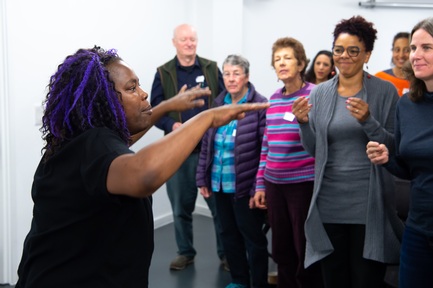Power of song: GP calls for 'seismic shift' from medication to social prescribing
A GP is calling for a “seismic shift” away from medication and towards social prescribing, after she found a communal singing group boosted women’s self-esteem and overcame the negative impact of social isolation and loneliness.

Sarah Andersen, a GP, who recently completed a Master's degree in Global Health at Brighton and Sussex Medical School, told the Singing for Wellbeing event held at the University of Sussex that her project showed the importance of singing in helping women build a sense of solidarity with other women.
She revealed how one woman was able to escape from her abusive partner by joining a choir in secret which then led to her finding a new job and a new place to live thanks to the invaluable camaraderie and support she found in the choir.
Dr Andersen said: “When they sang in harmony with others, they felt that it reduced the distance and differences between them and other choir singers and created a really special bond.”
Her research showed choral singing can improve women’s wellbeing through the joy of singing as well as experiencing singing as essential for survival - particularly in times of significantly poor health and mental health crisis.
In addition, she found group singing was a route to social connection - enhancing a sense of identity and belonging, and thereby increased self-confidence and self-esteem as well as promoting social inclusion.
Dr Andersen, a GP at Herstmonceux Integrative Health Centre which hosts choir sessions in its own practice building, added: “Research studying more than 300,000 people over seven years found that people with complex social connections, such as belonging to a choir or being part of a team, lived 50 per cent longer than those that didn’t. That is the same health benefit of choosing not to smoke so the health implications are real and hugely significant.
“We are in a slow burning crisis. Last month Public Health England reported that in a single year, one in four adults in the UK were prescribed sleeping tablets, strong painkillers including opiates, or anti-depressants.”
She would like to see social prescribing being much more widely used in the UK instead of GPs relying on medication.
An 80-year-old from Brighton called Tree, who attended the event, said: “When I was singing I felt in touch with my body and feelings, I felt strong and powerful. In one moment I sang lower than others and someone turned round to me as if to say that sounded nice and so I definitely felt that camaraderie with strangers.
“I’m very supportive of the idea of social prescribing. As it was said in the event, it is a systemic shift moving away from giving people lots of medication to give them something social.”
Charles Watters, Professor of Wellbeing and Social Care at the University of Sussex and CIRW director, added: “This exciting event has demonstrated the powerful impact singing and, in particular, participating in singing groups can have on people’s wellbeing.
“In putting on this event, our centre seeks to showcase important innovations and to demonstrate the ways in which research agendas are being reshaped. The new era of social prescribing offers unprecedented opportunities to transform our practices and understanding of ways to enhance wellbeing.”
There are currently more than two million people in the UK who sing in a choir on a weekly basis.
Latest News
 29-Jul-24
Dementia Bus gives carehome.co.uk staff insight into life with dementia
29-Jul-24
Dementia Bus gives carehome.co.uk staff insight into life with dementia
 01-Mar-24
Find out the top care homes in 2024
01-Mar-24
Find out the top care homes in 2024
 21-Mar-23
UK's top care homes in 2023 revealed
21-Mar-23
UK's top care homes in 2023 revealed
 03-Jan-23
carehome.co.uk launches free care helpline
03-Jan-23
carehome.co.uk launches free care helpline
 13-Dec-22
5 mins with Emily Whitehurst, chief operating officer for Constantia Healthcare
13-Dec-22
5 mins with Emily Whitehurst, chief operating officer for Constantia Healthcare